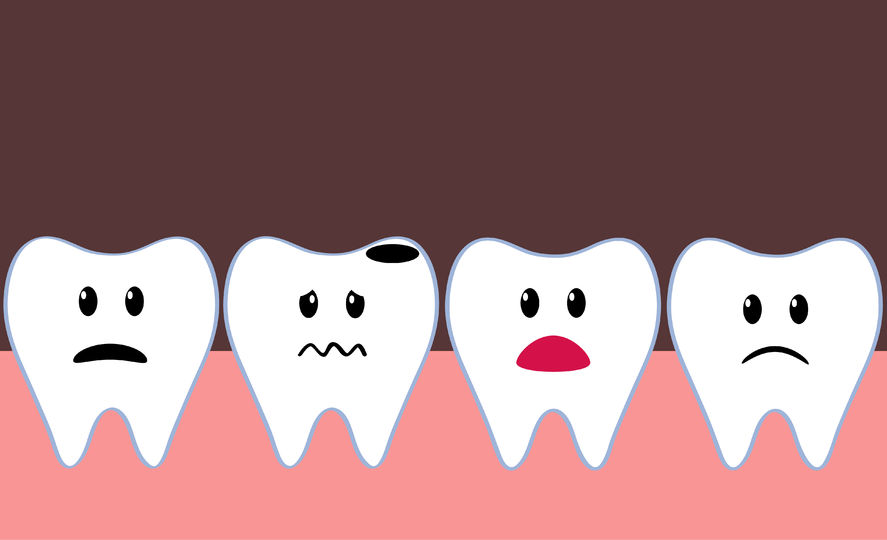
Everything You Need To Know About Thumb Sucking and Teeth
December 13, 2019
The Keto Diet and Oral Health
January 17, 2020Pain is often a warning of a health issue that needs attention or treatment. Patients often ask us, “What can cause a toothache?” There are multiple things that can cause oral pain. In most cases, your dental or medical professional can relieve you from this pain with the correct treatment.
Keep in mind that jaw and mouth pain have a diverse range of causes ranging from untreated dental problems to very serious life-threatening conditions like heart attacks. This article is not intended to replace medical and dental care, it is to inform our patients of the range of possibilities and to explain why it is crucial that anyone experiencing pain seek professional care.
What Can Cause a Toothache – 7 Possibilities
This list is not comprehensive, but it should give you an idea of some of the root causes of toothaches and why it is important to describe all the symptoms to your care providers. Many of these dental problems are preventable, so we included a refresher on which at-home dental hygiene techniques can help.
1. Tooth Decay
Cavities and damage to the teeth are often the answer to what can cause a toothache. This is one reason it is important to have regular dental examinations and professional cleaning. Toothaches from decay tend to go away once your dentist fills the cavity.
Prevention: To prevent tooth decay, limit sugary and acidic foods and beverages between meals. Also, brush your teeth twice a day using a soft-bristled toothbrush and toothpaste containing fluoride. Daily flossing also helps clean the spaces where your toothbrush can’t reach.
2. Gum Disease or Inflammation
Gum inflammation due to bacteria is another leading cause of toothaches. Gingivitis and periodontitis are two conditions that may cause pain. Gingivitis results in swollen gums that easily bleed. Periodontitis is the result of a longer-term infection that also impacts the bones and other tissue surrounding the teeth. The treatment for gingivitis is a professional cleaning and conscientious attention to gum hygiene. More advanced periodontitis may require more specialized intervention from a dentist. The first step to relief is an examination.
Prevention: Floss your teeth daily. The gums typically become inflamed as a reaction to the bacteria. Flossing helps remove it. Consider using mouthwash as well.
3. Injury or Abscess
Trauma, injury, or abscess also may cause pain and could be the answer to what can cause a toothache. If you experience an injury, broken teeth, or new pain be sure to contact your dentist immediately for an appointment since you need immediate attention.
One sign of a dental abscess is a swollen, painful bump near a sore tooth. Such pain may be especially intense when you bite down.
Prevention: While it isn’t possible to prevent all trauma, wearing a dental guard during contact sports helps prevent some sports-related trauma and injury. Discuss your lifestyle (and your children’s activities) with your dentist to learn more specific strategies to suit your needs.
4. Sinus Infection
Sometimes people are surprised to learn that a sinus infection may cause a toothache. According to the Mayo Clinic, this pain usually manifests around the rear teeth and it is a fairly common symptom of sinus conditions. The sinuses are found around the cheekbones, forehead and inner corners of the eyes.
The first step to relief is still a dental examination in order to rule out other causes such as gum disease. If the cause doesn’t appear to be dental, make an appointment with your primary care physician for diagnosis and treatment of the underlying condition.
5. Repetitive Motions Like Grinding the Teeth
Bruxism, otherwise known as grinding the teeth, is another common cause of toothaches. People with this condition clench their jaw and grind their teeth either while awake or asleep. Those who do it in their sleep may not even be aware they have this condition.
Prevention: The treatment varies depending on the severity. For some, it is a stress-related condition so relaxation or stress management techniques may help. Others find that wearing a mouthguard protects their teeth from damage. In some cases, bruxism is caused by serious dental misalignment or other issues that need the attention of a dentist.
6. Temporomandibular Joint Disorder (TMJ)
TMJ disorder is a condition that happens when the joint that connects the upper and lower jaw doesn’t function as it should. This joint is a ball and socket that allows the lower jaw to move forward, backward, and side to side. Some symptoms in addition to the pain include hearing a clicking sound when opening and closing the mouth. TMJ disorder is sometimes connected to bruxism. The first step to relief is a dental examination, be sure to discuss all your symptoms and discomfort with the dentist even if you are not sure whether it is related to your toothache.
7. Cluster Headaches or Migraine
Sometimes headaches can be triggered by dental issues such as TMJ disorder and in some cases, a migraine headache may cause jaw pain.
Keep current with all your medical exams and treatment plans including your dental care, primary care, and your optometrist. Headaches have so many potential causal factors involving all aspects of your health.
Symptoms of Toothaches
Toothache pain ranges from mild aching through sharp, sudden pain. Pay attention to the pain and think about how you would accurately describe it since the nature and severity of the pain is helpful information for your dentist and other professionals.
In addition to pain, other symptoms include:
- Headache
- Swelling in the soft tissues like gums
- An unpleasant taste in the mouth
- Dizziness
- Fever
Be sure to discuss all your symptoms since this may help your dentist identify and treat the root cause of the pain. If after a dental examination, your toothache doesn’t appear to have a dental cause be sure and see your primary care doctor.
In some cases, a toothache can be a symptom of another serious condition like shingles or heart disease. If your pain is intense and comes with other distressing symptoms seek immediate medical attention from your primary care physician or even the emergency room in some cases.
Schedule Your Examination Today
The first step of treating and preventing the most common types of toothaches is your dental examination and professional cleaning. If you live in Charlotte and you are looking for a dental provider, contact us today. For over ten years, the team at Southview Dentistry has had the privilege of helping Charlotte residents enjoy a healthy and pain-free smile.




